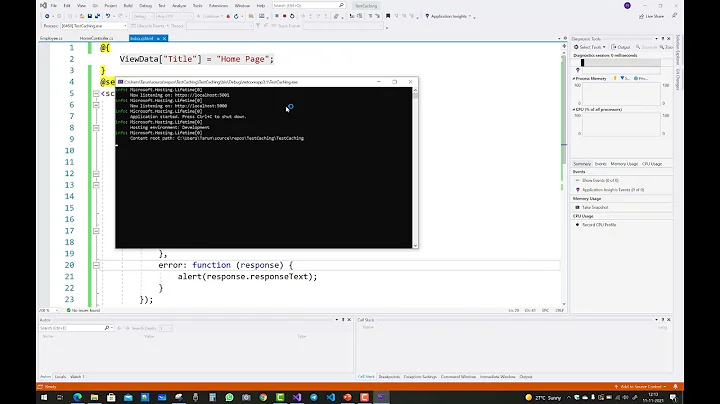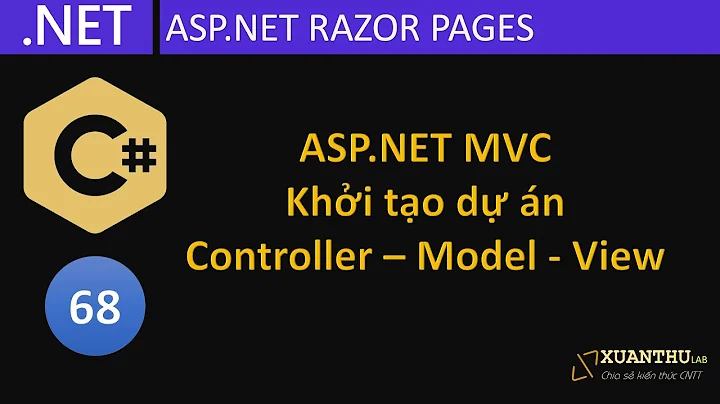Measure Time Invoking ASP.NET MVC Controller Actions
Solution 1
Could you create a global action filter? Something like this:
public class PerformanceTestFilter : IActionFilter
{
private Stopwatch stopWatch = new Stopwatch();
public void OnActionExecuting(ActionExecutingContext filterContext)
{
stopWatch.Reset();
stopWatch.Start();
}
public void OnActionExecuted(ActionExecutedContext filterContext)
{
stopWatch.Stop();
var executionTime = stopWatch.ElapsedMilliseconds;
// Do something with the executionTime
}
}
and then add it to your GlobalFilters collection in `Application_Start()'
GlobalFilters.Filters.Add(new PerformanceTestFilter());
You can get details about the controller being tested from the filterContext parameter.
UPDATE
Adding the filter to the GlobalFilters collection directly will create a single instance of the filter for all actions. This, of course, will not work for timing concurrent requests. To create a new instance for each action, create a filter provider:
public class PerformanceTestFilterProvider : IFilterProvider
{
public IEnumerable<Filter> GetFilters(ControllerContext controllerContext, ActionDescriptor actionDescriptor)
{
return new[] {new Filter(new PerformanceTestFilter(), FilterScope.Global, 0)};
}
}
Then instead of adding the filter directly, rather add the filter provider in Application_Start():
FilterProviders.Providers.Add(new PerformanceTestFilterProvider());
Solution 2
I usually add this simple code to the bottom of my Layout view:
<!-- Page generated in @((DateTime.UtcNow - HttpContext.Current.Timestamp.ToUniversalTime()).TotalSeconds.ToString("F4")) s -->
Outputs something like:
<!-- Page generated in 0.4399 s -->
This starts measuring when the HttpContext is created (according to the documentation), and stops right before writing to output, so it should be pretty accurate.
It might not work for all use cases (if you want to measure child actions, or ignore the time outside the MVC action, etc.), but it's easy to paste into a view.
For more advanced diagnostics, I used to use Glimpse.
Solution 3
Try ASP.NET 4.5 Page Instrumentation
It instruments page rendering: The time of your app might be spent in the controller, but there are lots of times where it is spent in the viewrendering. Especially if you have lots of partials and html helpers.
Related videos on Youtube
Eric J.
Eric Johannsen VP of Engineering at GrowFlow Email: my first name at my last name dot us Science Fiction author The Gods We Make The Gods We Seek Ji-min Co-author C# 8.0 in a Nutshell
Updated on June 11, 2022Comments
-
 Eric J. almost 2 years
Eric J. almost 2 yearsSome users of an MVC 4 app are experiencing sporadic slowness. Presumably not every user reports that problem every time it happens to them.
My thought is to measure the time spent in each controller action and log details of action invocations that exceed a prescribed time to facilitate further analysis (to rule in or rule out a server/code issue).
Is there a convenient way to hook in to perform such measurements so that I can avoid adding instrumentation code to each action? I'm not currently using IOC for this project and would hesitate to introduce it just to solve this issue.
Is there a better way to tackle this type of problem?
-
 Eric J. almost 12 yearsSounds promising. I'll give that a shot. An instance of PerformanceTestFilter is created for each action I presume (so that it has it's own Stopwatch instance)?
Eric J. almost 12 yearsSounds promising. I'll give that a shot. An instance of PerformanceTestFilter is created for each action I presume (so that it has it's own Stopwatch instance)? -
Kevin Aenmey almost 12 yearsActually... it doesn't. You need to create an
IFilterProviderfor that. See my updated answer. -
user1068352 almost 10 yearsTip:
StopwatchhasRestartmethod. -
Brian Low almost 10 yearsI couldn't find the global action filter in the tutorial. Tried searching for "global", "filter" and "timer" with no hits.
-
RickAndMSFT almost 10 yearsadded global filter to my answer
-
Guillaume86 about 9 yearsYou could also use
filterContext.HttpContext.Itemsto store your stopwatch and get it back after (andactionContext.Request.Propertiesfor WebApi filters). -
Imran Qadir Baksh - Baloch almost 9 yearsIsn't race condition there? If multiple requests use the same filter instance bradwilson.typepad.com/blog/2010/07/…
-
aruno about 7 yearsTip: put
stopWatch=nullat the end ofOnActionExecutedso you can be sure you're getting a new instance. If you get an exception you'll know the instance is being reused















![18. Adding your first controller [ActorsController] | ASP.NET MVC](https://i.ytimg.com/vi/nifGqo_9pR8/hq720.jpg?sqp=-oaymwEcCNAFEJQDSFXyq4qpAw4IARUAAIhCGAFwAcABBg==&rs=AOn4CLCrNNwEkMHfPXHihxzL-WsC5OR_QA)